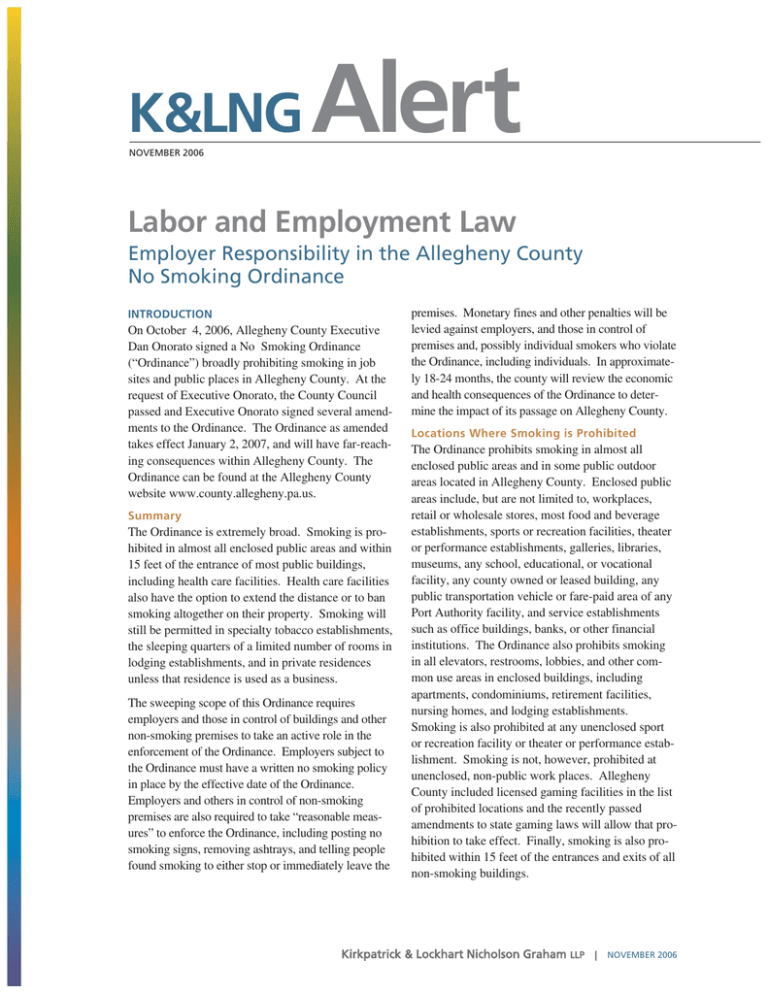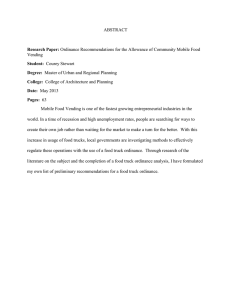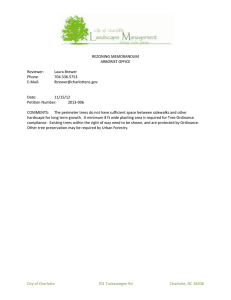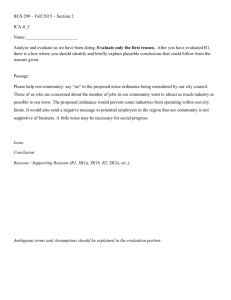
K&LNG
NOVEMBER 2006
Alert
Labor and Employment Law
Employer Responsibility in the Allegheny County
No Smoking Ordinance
INTRODUCTION
On October 4, 2006, Allegheny County Executive
Dan Onorato signed a No Smoking Ordinance
(“Ordinance”) broadly prohibiting smoking in job
sites and public places in Allegheny County. At the
request of Executive Onorato, the County Council
passed and Executive Onorato signed several amendments to the Ordinance. The Ordinance as amended
takes effect January 2, 2007, and will have far-reaching consequences within Allegheny County. The
Ordinance can be found at the Allegheny County
website www.county.allegheny.pa.us.
Summary
The Ordinance is extremely broad. Smoking is prohibited in almost all enclosed public areas and within
15 feet of the entrance of most public buildings,
including health care facilities. Health care facilities
also have the option to extend the distance or to ban
smoking altogether on their property. Smoking will
still be permitted in specialty tobacco establishments,
the sleeping quarters of a limited number of rooms in
lodging establishments, and in private residences
unless that residence is used as a business.
The sweeping scope of this Ordinance requires
employers and those in control of buildings and other
non-smoking premises to take an active role in the
enforcement of the Ordinance. Employers subject to
the Ordinance must have a written no smoking policy
in place by the effective date of the Ordinance.
Employers and others in control of non-smoking
premises are also required to take “reasonable measures” to enforce the Ordinance, including posting no
smoking signs, removing ashtrays, and telling people
found smoking to either stop or immediately leave the
premises. Monetary fines and other penalties will be
levied against employers, and those in control of
premises and, possibly individual smokers who violate
the Ordinance, including individuals. In approximately 18-24 months, the county will review the economic
and health consequences of the Ordinance to determine the impact of its passage on Allegheny County.
Locations Where Smoking is Prohibited
The Ordinance prohibits smoking in almost all
enclosed public areas and in some public outdoor
areas located in Allegheny County. Enclosed public
areas include, but are not limited to, workplaces,
retail or wholesale stores, most food and beverage
establishments, sports or recreation facilities, theater
or performance establishments, galleries, libraries,
museums, any school, educational, or vocational
facility, any county owned or leased building, any
public transportation vehicle or fare-paid area of any
Port Authority facility, and service establishments
such as office buildings, banks, or other financial
institutions. The Ordinance also prohibits smoking
in all elevators, restrooms, lobbies, and other common use areas in enclosed buildings, including
apartments, condominiums, retirement facilities,
nursing homes, and lodging establishments.
Smoking is also prohibited at any unenclosed sport
or recreation facility or theater or performance establishment. Smoking is not, however, prohibited at
unenclosed, non-public work places. Allegheny
County included licensed gaming facilities in the list
of prohibited locations and the recently passed
amendments to state gaming laws will allow that prohibition to take effect. Finally, smoking is also prohibited within 15 feet of the entrances and exits of all
non-smoking buildings.
Kirkpatrick & Lockhart Nicholson Graham LLP |
NOVEMBER 2006
Smoking is prohibited in all health care facilities
including hospitals, clinics, physical therapy facilities, doctors’ offices, and any private home used as a
health care facility during the hours it is used as such.
Smoking is also not permitted in any vehicle owned
or leased by these facilities. Smoking is prohibited
within 15 feet of the entrances of all health care facilities and the operators of those facilities may choose
to increase the distance or ban smoking on all property owned by the facility.
Exceptions to the Prohibitions
Four exemptions from the Ordinance were created.
These include:
■
Specialty Tobacco Establishments (businesses
where at least 85% of their sales are tobacco or
tobacco related);
■
Lodging Establishments (all hotels, motels,
inns, resorts, bed and breakfasts, guest houses,
or any business or building providing
overnight lodging to customers) may choose to
designate up to 25% of their sleeping quarters
as smoking rooms;
■
Private residences, except during the period
when the private residence is being used as a
childcare, adult daycare, or other business
facility where smoking would be prohibited by
the Ordinance; and
■
Bars where 10% or less of their revenue is
from food sales and that employ less than 10
people are allowed to apply for a waiver that
will permit smoking in the establishment until
January 1, 2009.
Events held by volunteer organizations are also
exempted from the Ordinance, if minors are not
allowed to attend the event.
Responsibilities of Employers and Others
in Control of Premises
Employers have significant enforcement responsibilities under the Ordinance. All employers subject to
the Ordinance must create, implement, communicate,
and maintain a written policy that prohibits smoking
in any area of the workplace subject to the
Ordinance. All employees must be notified of this
policy within 30 days of its adoption and copies of
the policy must be made available to all employees
and prospective employees. This written policy must
be implemented by the effective date of the
Ordinance. Employees who are covered under a current collective bargaining agreement that includes
2
provisions regarding covered employees’ right to
smoke in the workplace are not covered by the
Ordinance, but instead are governed by the applicable provisions of the bargaining agreement.
The Ordinance also includes a provision prohibiting
retaliation against employees, applicants for employment, or customers for reporting any violation of the
Ordinance. Employees who choose to work in an
environment where their employer allows smoking
do not surrender any legal rights they may have
against their employer or other parties. Any violation of this retaliation provision is considered a violation of the Ordinance and is punishable by the same
penalties as outlined below.
Owners, operators, managers, employers, or other
persons in control of non-smoking locations must
take reasonable care to ensure that no person smokes
in violation of the Ordinance. This includes posting
“No Smoking” signs that are no less than 6” in height
with lettering no less than 4” in height throughout the
premises and on all entrances. The symbol of a lit
cigarette with a line going through it is acceptable as
long as it meets the required dimensions. All
entrances and exits must contain signs indicating “No
Smoking within 15 Feet of this Sign.” All ashtrays
must be removed from regulated areas. People who
are found smoking in regulated areas must be told to
immediately stop smoking or leave the premises.
Owners and operators of non-smoking buildings also
must provide written notice of all violations, including the potential penalties to lessees, within two business days of receiving complaints. An owner, operator or employer will not be cited for a violation if the
foregoing steps are taken.
Enforcement and Penalties
This Ordinance is enforced by the Allegheny County
Health Department and by municipal law enforcement agencies. Citizens can report Ordinance violations to a telephone hotline that will be administered
by the Health Department. The Health Department
will also keep records of all violations and impose
fines on all violators. There is a specific provision
that prohibits any private right of action.
For the first 180 days the Ordinance is in effect, the
first violation of the Ordinance will result in a warning. All subsequent violations will be a $250 fine.
After the first 180 days, the first two violations result
in a $250 fine. The third violation (and all subsequent violations thereafter) in addition to more fines
Kirkpatrick & Lockhart Nicholson Graham
LLP
|
NOVEMBER 2006
could lead to a suspension of any licenses or permits
granted to the violator by the Allegheny County
Health Department for up to 180 days. Each lit cigarette, pipe, cigar, or other smoking instrument is considered an individual violation.
Potential Issues
The breadth of this Ordinance has raised a number of
potential issues and problems. The County Council
has promised to complete a health and economic
impact study within 18-24 months after the passage
of the Ordinance to analyze the effect the Ordinance
is having on the county, but there are more immediate issues.
■
By prohibiting smoking within 15 feet of the
entrances of all buildings where smoking is not
permitted, the Ordinance effectively bans
smoking altogether in some areas.
■
The Ordinance also exempts workers covered
under a current collective bargaining
agreement that addresses smoking in the
workplace, but what happens when that
bargaining agreement expires? Are those
employees then free to renegotiate the issue or
does the Ordinance then supersede the
bargaining agreement?
■
3
The Ordinance states that it does not create any
private rights of action but does not clarify the
exact meaning of that provision.
■
It is unclear whether employees of volunteer
organizations or employees of locations where
the fundraising event is held are covered by
the Ordinance.
■
Finally, may an individual smoker be fined for
smoking in a no smoking area? Fines may be
levied against “individuals” and that may
include smokers.
The biggest issue, however, is the responsibility that
ithe Ordinance places on businesses and others in
control of non-smoking premises to enforce the
Ordinance. Within a very short time frame, businesses are expected to create written smoking policies
and take reasonable efforts to ensure compliance with
the Ordinance by not only their employees, but also
visitors and others on their premises. With its comprehensive scope and numerous requirements, the
Allegheny County No Smoking Ordinance goes
beyond merely bars and restaurants and requires
many people and businesses in Allegheny County to
become an active part of Ordinance enforcement.
Samantha L. Brutout
412.355.6255
sbrutout@klng.com
Hayes C. Stover
412.355.6476
hstover@klng.com
Kirkpatrick & Lockhart Nicholson Graham
LLP
|
NOVEMBER 2006
If you have questions or would like more information about K&LNG’s Labor and Employment Law
Practice, please contact one of our lawyers listed below.
Boston
Henry T. Goldman
Mark D. Pomfret
617.951.9156
617.261.3147
hgoldman@klng.com
mpomfret@klng.com
Dallas
Von E. Hays
Jaime Ramón
214.939.4959
214.939.4902
vhays@klng.com
jramon@klng.com
Harrisburg
Carleton O. Strouss
717.231.4503
cstrouss@klng.com
London
Paul Callegari
Los Angeles
+44.20.7360.8194
pcallegari@klng.com
Thomas H. Petrides
Paul W. Sweeney, Jr.
310.552.5077
310.552.5055
tpetrides@klng.com
psweeney@klng.com
Miami
April L. Boyer
Judd J. Goldberg
Carol C. Lumpkin
Michael C. Marsh
305.539.3380
305.539.3344
305.539.3323
305.539.3321
aboyer@klng.com
jgoldberg@klng.com
clumpkin@klng.com
mmarsh@klng.com
Newark
Rosemary Alito
Vincent N. Avallone
973.848.4022
973.848.4027
ralito@klng.com
vavallone@klng.com
New York
Eva M. Ciko
212.536.3905
eciko@klng.com
Palo Alto
Linda L. Usoz
650.798.6702
lusoz@klng.com
Pittsburgh
David J. Kolesar
Stephen M. Olson
Michael A. Pavlick
Hayes C. Stover
412.355.6252
412.355.6496
412.355.6275
412.355.6476
dkolesar@klng.com
solson@klng.com
mpavlick@klng.com
hstover@klng.com
San Francisco
Linda L. Usoz
650.798.6702
lusoz@klng.com
Washington
Lawrence C. Lanpher
202.778.9011
llanpher@klng.com
www.klng.com
BOSTON
■
DALLAS
■
HARRISBURG
■
LONDON
■
LOS ANGELES
■
MIAMI
■
NEWARK
■
NEW YORK
■
PALO ALTO
■
PITTSBURGH
■
SAN FRANCISCO
■
WASHINGTON
Kirkpatrick & Lockhart Nicholson Graham (K&LNG) has approximately 1,000 lawyers and represents entrepreneurs, growth and middle market companies, capital markets participants, and leading FORTUNE 100 and FTSE 100 global corporations nationally and internationally.
K&LNG is a combination of two limited liability partnerships, each named Kirkpatrick & Lockhart Nicholson Graham LLP, one qualified in Delaware,
U.S.A. and practicing from offices in Boston, Dallas, Harrisburg, Los Angeles, Miami, Newark, New York, Palo Alto, Pittsburgh, San Francisco and
Washington and one incorporated in England practicing from the London office.
This publication/newsletter is for informational purposes and does not contain or convey legal advice. The information herein should not be used or relied
upon in regard to any particular facts or circumstances without first consulting a lawyer.
Data Protection Act 1988—We may contact you from time to time with information on Kirkpatrick & Lockhart Nicholson Graham LLP seminars and with
our regular newsletters, which may be of interest to you. We will not provide your details to any third parties. Please e-mail london@klng.com if you
would prefer not to receive this information.
© 2006 KIRKPATRICK & LOCKHART NICHOLSON GRAHAM LLP. ALL RIGHTS RESERVED.






